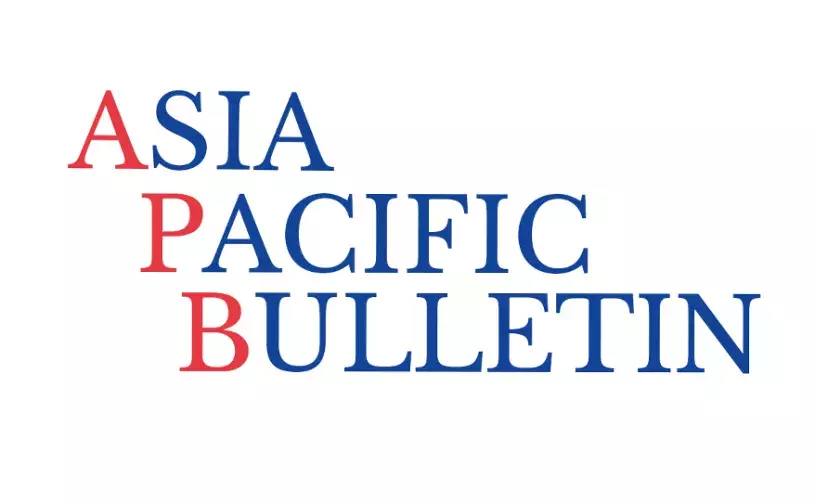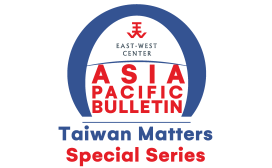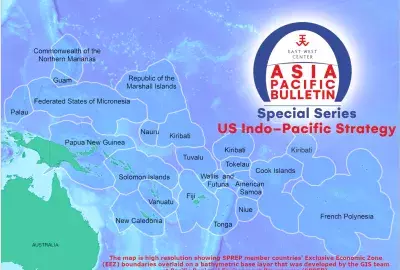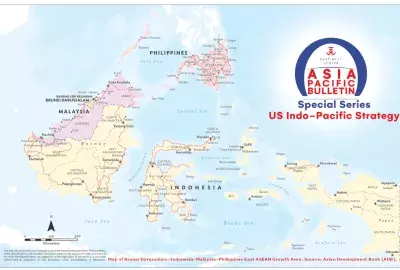Error message


|
Denny Roy, Senior Fellow at the East-West Center, explains that "[f]or US policymakers, a strategy of confronting Beijing with its worst fear, the “splitting” of “China,” in the hope this will cause China to permanently rule out the use of force against Taiwan, is problematic." |
The best way to avoid a Taiwan Strait war is not by making Beijing think Washington is promoting independent statehood for Taiwan via a parade of new government-to-government contacts. For US policymakers, a strategy of confronting Beijing with its worst fear, the “splitting” of “China,” in the hope this will cause China to permanently rule out the use of force against Taiwan, is problematic. China’s bulked-up military has purposefully acquired weapons systems that would make unwanted US intervention in the western rim of the Pacific difficult. At the same time, the United States has not demonstrated the willingness or ability to maintain what was until recently an overwhelming military advantage over China. Washington needs a nuanced approach that avoids unnecessarily and unintentionally pushing Beijing toward its last resort.
China’s Taiwan policy is partly pre-determined and partly reactive. The unchangeable core of the policy includes maintaining a credible threat to seize Taiwan by force if the possibility of unification on Beijing’s terms appears to be permanently disappearing. For the People’s Republic of China (PRC) leadership, peaceful (even if coerced) unification is vastly preferable to war.
The prominence of China’s threat to go to war against Taiwan is reactive, varying depending on political decisions made in Taipei and Washington. Although the independence-leaning Democratic Progressive Party has controlled the government since 2016, Taipei’s government under President Tsai Ing-wen has not made major moves toward de jure independence. Recent adjustments in US policy toward Taiwan, however, have alarmed the PRC.
Chinese elites have long believed the United States is committed to “containing” China, by which they mean suppressing China’s increase in relative economic, military, and diplomatic power and global influence, a geopolitical reset that allows Beijing to challenge Washington’s international agenda. This is an uncritical belief that largely ignores the facts that the United States has done more to abet the “rise” of China than any other country, and that Americans continue to pour wealth, expertise and technology into China despite the recent downturn in Sino-US relations. The dominant view in China today is that the United States is increasing its “containment” efforts because China has closed the power gap to the point of becoming a threat to US pre-eminence. The Chinese Communist Party (CCP)-prescribed narrative further asserts that Washington is trying to use Taiwan as a means of weakening China: that is, by thwarting Taiwan-PRC political unification, the United States will prevent China from realizing its potential and from achieving the national “rejuvenation” touted by CCP General Secretary Xi Jinping.
PRC observers see evidence of this alleged US effort to contain China by promoting permanent Taiwan independence in the many moves by Washington under both the Trump and Biden Administrations to upgrade US relations with the Taipei government. Some of these moves were part of a useful and long-overdue removal of unnecessary US self-restrictions on coordination with Taipei, but others were unsubstantial virtue-signaling by certain members of Congress.
With few other politically acceptable options available, Beijing has attempted to halt this trend by demonstrating, mainly through military exercises and flying warplanes near Taiwan, its determination to go to war to prevent or overturn de jure Taiwan political independence from China. PRC Ambassador to the United States Qin Gang stated this bluntly in a January interview with National Public Radio: “If the Taiwanese authorities, emboldened by the United States, keep going down the road for independence, it most likely will involve China and the United States... in a military conflict,” he said.
Ideally, US policy to manage cross-Strait tensions should address the pre-determined aspects of PRC strategy—principally China’s effort to make a Taiwan Strait war winnable—while attempting to minimize Chinese reactions that raise tensions and avoid actions that convince CCP leaders that war is their least-bad option.
Washington’s “strategic ambiguity” approach is laudable in its balance. It has convinced PRC strategists and US allies that American intervention in a cross-Strait war is likely, but it also recognizes the folly of trying to force China into a humiliating retreat by openly declaring US hostility to the Chinese government’s “core interest” of unification.
Specific US acts of support for Taiwan should follow the same general principle.
Policies are productive if they improve Taiwan’s ability to defend itself or to coordinate with intervening US forces, and thereby strengthen deterrence.
On the other hand, policies are counter-productive if they enflame Chinese public opinion with the consequence of creating additional pressure on Chinese leaders to lean more heavily into a bellicose posture. The ultimate result could be goading Beijing into a war it otherwise would have delayed or avoided altogether.
Jennifer K. Hong Whetsell, Senior Director, the Project 2049 Institute Jennifer K. Hong Whetsell, Senior Director, the Project 2049 Institute For example, the US Department of Defense routinely sponsors training for Republic of China (ROC) military personnel, including ROC Air Force F-16 pilots in Arizona and ROC Marines in Taiwan and on Guam. ROC non-commissioned officers observe the training of US NCOs, and ROC officers attend US military educational institutions. Americans mentor ROC personnel in how to use and maintain military equipment purchased from the United States. US officials have preferred to keep this cooperation low-key. It was Tsai’s government, not Washington, that late last year publicly drew attention to the presence of US soldiers on the island training their ROC counterparts.
The worst policies are the opposite—high profile and maximally provocative, with little or no enhancement of Taiwan’s defense capability. An example was the plan, reported in April, for US Speaker of the House of Representatives Nancy Pelosi to visit Taiwan. The trip would have had symbolic value but no military utility. Although the trip was soon cancelled, the idea produced an extraordinary level of rage in China, fueling the pessimistic view that war with the United States is unavoidable. PRC Foreign Minister Wang Yi, who rarely comments on trips to Taiwan by specific Americans, said publicly that Pelosi going to Taiwan would cross a PRC “red line”
Taiwan deserves international respect, and the CCP government under Xi in many respects deserves international condemnation. Nevertheless, we must recognize that indulging in feeding Chinese suspicions that the US unofficially supports Taiwan statehood in contradiction of stated US policy has more cost than benefit. Ultimately that cost would fall most heavily on Taiwan itself. The real task here is bolstering deterrence, and it is best done with quiet determination rather than fanfare.

|
Denny Roy, Senior Fellow at the East-West Center, explains that "[f]or US policymakers, a strategy of confronting Beijing with its worst fear, the “splitting” of “China,” in the hope this will cause China to permanently rule out the use of force against Taiwan, is problematic." |
The best way to avoid a Taiwan Strait war is not by making Beijing think Washington is promoting independent statehood for Taiwan via a parade of new government-to-government contacts. For US policymakers, a strategy of confronting Beijing with its worst fear, the “splitting” of “China,” in the hope this will cause China to permanently rule out the use of force against Taiwan, is problematic. China’s bulked-up military has purposefully acquired weapons systems that would make unwanted US intervention in the western rim of the Pacific difficult. At the same time, the United States has not demonstrated the willingness or ability to maintain what was until recently an overwhelming military advantage over China. Washington needs a nuanced approach that avoids unnecessarily and unintentionally pushing Beijing toward its last resort.
China’s Taiwan policy is partly pre-determined and partly reactive. The unchangeable core of the policy includes maintaining a credible threat to seize Taiwan by force if the possibility of unification on Beijing’s terms appears to be permanently disappearing. For the People’s Republic of China (PRC) leadership, peaceful (even if coerced) unification is vastly preferable to war.
The prominence of China’s threat to go to war against Taiwan is reactive, varying depending on political decisions made in Taipei and Washington. Although the independence-leaning Democratic Progressive Party has controlled the government since 2016, Taipei’s government under President Tsai Ing-wen has not made major moves toward de jure independence. Recent adjustments in US policy toward Taiwan, however, have alarmed the PRC.
Chinese elites have long believed the United States is committed to “containing” China, by which they mean suppressing China’s increase in relative economic, military, and diplomatic power and global influence, a geopolitical reset that allows Beijing to challenge Washington’s international agenda. This is an uncritical belief that largely ignores the facts that the United States has done more to abet the “rise” of China than any other country, and that Americans continue to pour wealth, expertise and technology into China despite the recent downturn in Sino-US relations. The dominant view in China today is that the United States is increasing its “containment” efforts because China has closed the power gap to the point of becoming a threat to US pre-eminence. The Chinese Communist Party (CCP)-prescribed narrative further asserts that Washington is trying to use Taiwan as a means of weakening China: that is, by thwarting Taiwan-PRC political unification, the United States will prevent China from realizing its potential and from achieving the national “rejuvenation” touted by CCP General Secretary Xi Jinping.
PRC observers see evidence of this alleged US effort to contain China by promoting permanent Taiwan independence in the many moves by Washington under both the Trump and Biden Administrations to upgrade US relations with the Taipei government. Some of these moves were part of a useful and long-overdue removal of unnecessary US self-restrictions on coordination with Taipei, but others were unsubstantial virtue-signaling by certain members of Congress.
With few other politically acceptable options available, Beijing has attempted to halt this trend by demonstrating, mainly through military exercises and flying warplanes near Taiwan, its determination to go to war to prevent or overturn de jure Taiwan political independence from China. PRC Ambassador to the United States Qin Gang stated this bluntly in a January interview with National Public Radio: “If the Taiwanese authorities, emboldened by the United States, keep going down the road for independence, it most likely will involve China and the United States... in a military conflict,” he said.
Ideally, US policy to manage cross-Strait tensions should address the pre-determined aspects of PRC strategy—principally China’s effort to make a Taiwan Strait war winnable—while attempting to minimize Chinese reactions that raise tensions and avoid actions that convince CCP leaders that war is their least-bad option.
Washington’s “strategic ambiguity” approach is laudable in its balance. It has convinced PRC strategists and US allies that American intervention in a cross-Strait war is likely, but it also recognizes the folly of trying to force China into a humiliating retreat by openly declaring US hostility to the Chinese government’s “core interest” of unification.
Specific US acts of support for Taiwan should follow the same general principle.
Policies are productive if they improve Taiwan’s ability to defend itself or to coordinate with intervening US forces, and thereby strengthen deterrence.
On the other hand, policies are counter-productive if they enflame Chinese public opinion with the consequence of creating additional pressure on Chinese leaders to lean more heavily into a bellicose posture. The ultimate result could be goading Beijing into a war it otherwise would have delayed or avoided altogether.
Jennifer K. Hong Whetsell, Senior Director, the Project 2049 Institute Jennifer K. Hong Whetsell, Senior Director, the Project 2049 Institute For example, the US Department of Defense routinely sponsors training for Republic of China (ROC) military personnel, including ROC Air Force F-16 pilots in Arizona and ROC Marines in Taiwan and on Guam. ROC non-commissioned officers observe the training of US NCOs, and ROC officers attend US military educational institutions. Americans mentor ROC personnel in how to use and maintain military equipment purchased from the United States. US officials have preferred to keep this cooperation low-key. It was Tsai’s government, not Washington, that late last year publicly drew attention to the presence of US soldiers on the island training their ROC counterparts.
The worst policies are the opposite—high profile and maximally provocative, with little or no enhancement of Taiwan’s defense capability. An example was the plan, reported in April, for US Speaker of the House of Representatives Nancy Pelosi to visit Taiwan. The trip would have had symbolic value but no military utility. Although the trip was soon cancelled, the idea produced an extraordinary level of rage in China, fueling the pessimistic view that war with the United States is unavoidable. PRC Foreign Minister Wang Yi, who rarely comments on trips to Taiwan by specific Americans, said publicly that Pelosi going to Taiwan would cross a PRC “red line”
Taiwan deserves international respect, and the CCP government under Xi in many respects deserves international condemnation. Nevertheless, we must recognize that indulging in feeding Chinese suspicions that the US unofficially supports Taiwan statehood in contradiction of stated US policy has more cost than benefit. Ultimately that cost would fall most heavily on Taiwan itself. The real task here is bolstering deterrence, and it is best done with quiet determination rather than fanfare.







